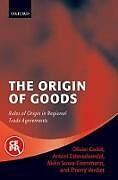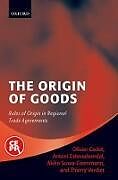The Origin of Goods
Einband:
Fester Einband
EAN:
9780199290482
Autor:
O.; Estevadeordal, A.; Suwa, A.; Et Al Cadot
Herausgeber:
OUP Oxford
Erscheinungsdatum:
23.02.2006
Looks at rules of origin in preferential trading agreements and their growing importance in trade negotiations. This book shows that the rules of origin can act as powerful barriers to trade and have been deliberately used as such.
`This book by some of the world's leading experts in the field is a state-of-the-art analysis of a complex and oft-neglected aspect of trade policy. With the growth of regionalism, rules of origin become more significant by the day, yet remain poorly understood. The present work goes a long way in remedying this deficiency. It comprises an enticing blend of economic theory and empirical study, together with political economy and development analysis. ' Patrick Low, Director of Economic Research and Statistics, WTO Secretariat
Autorentext
Olivier Cadot is Professor of Economics at the University of Lausanne and Director of the Institut d´ Economie Appliquée (Créa). He was previously Associate Professor at INSEAD and has held visiting positions at UCLA and McGill. He holds a Ph.D in Economics from Princeton University and a Master´ s in Economic History from McGill University. He is a fellow of the CEPR and an associate scholar of the CERDI and CEPREMAP. He also serves on the editorial board of the Revue d´ Economie du Développement. Thierry Verdier is Director of DELTA, Senior Civil Engineer and Research Director at the Institute for Advanced Studies in Social Sciences (Ecole des Hautes Etudes en Sciences Sociales, EHESS) in Paris. He is also the Co-director of the International Trade Programme at the Centre for Economic Policy Research (CEPR), London. His master and doctoral degrees were received from Ecole Polytechnique, Ecole des Ponts et Chaussées and EHESS. Antoni Estevadeordal is a Principal Trade Economist and Research Coordinator at the Integration, Trade and Hemispheric Issues Division of the Inter-American Development Bank (IDB). Before joining the IDB he taught at the University of Barcelona and Harvard University. He has published widely in major journals, most recently in American Economic Review, Quarterly Journal of Economics, Review of International Economics, Journal of Economic Integration, Economia and the Journal of World Trade. He holds a PhD and MA in Economics from Harvard University and a BA in Economics from the University of Barcelona. Akiko Suwa-Eisenmann is an Economist at INRA, National Institute for Agricultural Research, France. She is Director of Laboratoire d'Economie Appliquée, on the Paris-Jourdan campus. She teaches Development Economics at the Ecole des Hautes Etudes en Sciences Sociales PhD programme and ENSAE, Paris. Her graduate and doctoral degrees were received from Ecole Normale Supérieure and EHESS. She worked as a consultant for the World Bank and the OECD Development Centre.
Zusammenfassung
The dark side of preferential trade agreements, Rules of Origin (RoO) are used to determine the eligibility of goods to preferential treatment. Ostensibly meant to prevent the trans-shipment of imported products across Free Trade Agreement borders after superficial screwdriver assembly, they act in reality as complex and opaque trade barriers. This book provides evidence strongly suggesting that they do so by intent rather than accidentally---in other words, that RoOs are policy. Part one draws insights about the effects of RoOs on cross-border trade and outsourcing from recent economic theory. Part two reviews the evidence on RoOs in preferential agreements around the world, putting together the most comprehensive dataset on RoOs to date. Part three explores their "political economy"---how special interests have shaped them and continue to do so. Part four provides econometric evidence on their costs for exporters and consequent effects on trade flows. Finally, part five explores how they affect trade in the developing world where they spread rapidly and have the potential to do most harm. Beyond the collection of new evidence and its interpretation in light of recent theory, the book's overall message for the policy community is that RoOs are a potentially powerful and new barrier to trade. Rather than being relegated to closed-door technical meetings, their design should hold center-stage in trade negotiations.
Inhalt
Introduction: Rules of Origin in the World Trading System
Rules of Origin: Theoretical Perspectives
1: Kala Krishna: Understanding Rules of Origin
2: Matthias Thoenig and Thierry Verdier: The Impact of Rules of Origin on Strategic Outsourcing: an IO perspective
Rules of Origin in Regional Trade Agreements Around the World
3: Antoni Estevadeordal and Kati Suominen: Mapping and Measuring Rules of Origin Around the World
4: Americo Beviglia-Zampetti and Pierre Sauvé: Rules of Origin for Services: Economic and Legal Considerations
The Political Economy of Rules of Origin
5: Olivier Cadot, Antoni Estevadeordal and Akiko Suwa: Rules of Origin as Export Subsidies
6: I.M. Destler: Rules of Origin and US Trade Policy
Measuring the Impact of Rules of Origin
7: Celine Carrere and Jaime de Melo: Are Different Rules of Origin Equally Costly? Estimates from NAFTA
8: Pablo Sanguinetti and E. Bianchi: Implementing PTAs in the Southern Cone Region of Latin America: Rules of Origin
9: Joseph Francois: Preferential Trade Agreements and the Pattern of Production and Trade when Inputs are Differentiated
Rules of Origin and Development
10: Hennie Erasmus, Frank Flatters and Robert Kirk: Rules of Origin as Tools of Development? Some Lessons from SADC
11: Paul Brenton and Takako Ikezuki: Trade Preferences for Africa and the Impact of Rules of Origin

Leider konnten wir für diesen Artikel keine Preise ermitteln ...
billigbuch.ch sucht jetzt für Sie die besten Angebote ...
Die aktuellen Verkaufspreise von 6 Onlineshops werden in Realtime abgefragt.
Sie können das gewünschte Produkt anschliessend direkt beim Anbieter Ihrer Wahl bestellen.
Loading...
Die aktuellen Verkaufspreise von 6 Onlineshops werden in Realtime abgefragt.
Sie können das gewünschte Produkt anschliessend direkt beim Anbieter Ihrer Wahl bestellen.
| # | Onlineshop | Preis CHF | Versand CHF | Total CHF | ||
|---|---|---|---|---|---|---|
| 1 | Seller | 0.00 | 0.00 | 0.00 |
